|
|
|
Sort Order |
|
|
|
Items / Page
|
|
|
|
|
|
|
| Srl | Item |
| 1 |
ID:
096261
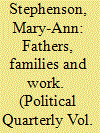

|
|
|
|
|
| Publication |
2010.
|
| Summary/Abstract |
This article is a review of Fathers, Families and Work, one of a series of reports published as part of the Equality and Human Rights Commission (EHRC)'s 'Working Better' programme. The article examines Fathers, Families and Work in the context of the wider conclusions and recommendations of the 'Working Better' programme and considers the extent to which these recommendations will translate into public policy. It concludes that there is a gap between parents' desire for both mothers and fathers to be involved in caring for children and the reality of long hours and inflexible workplaces that limits the time men can spend caring for children.
|
|
|
|
|
|
|
|
|
|
|
|
|
|
|
|
| 2 |
ID:
096258
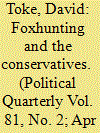

|
|
|
|
|
| Publication |
2010.
|
| Summary/Abstract |
The Conservatives are pledged to have a free vote in Parliament on legislation in Government time to reverse the 2004 Hunting Act. This Act bans hunting with dogs. The Countryside Alliance has opposed the Hunting Act as part of campaigns to defend its notion of rural interests. The Countryside Alliance's success in gaining the Tory pledge could be underscored by a Tory hope that hunting supporters give decisive support for Tory candidates in marginal Parliamentary constituencies. However, the Tory leadership may find it politically difficult to give early priority to legislative attempts to repeal the Hunting Act. Moreover, it is likely to require a large Tory majority and years of waiting before a Tory government is able and willing to complete a repeal of the hunting ban.
|
|
|
|
|
|
|
|
|
|
|
|
|
|
|
|
| 3 |
ID:
096262


|
|
|
|
|
| Publication |
2010.
|
| Summary/Abstract |
Governance structures in central government departments are poorly articulated. Departmental boards were imported from the private sector; in central government their remit and accountability are obscure, as is their role in relation to Permanent Secretaries and Ministers-whose leadership roles are also muddled. This brings costs for Ministers, departments and the public. Improvements have proved elusive, in part because an underlying confusion has been neglected-about how bodies subject to the almost unlimited democratic accountability of Ministers are to be governed. The confusion can be cleared up, principles of governance formulated, and concrete improvements proposed. These include: better articulation of Permanent Secretaries' presumptive leadership role; strengthened lines of external accountability; and more coherent provisions for the role and accountabilities of boards, and their relationship with Ministers, Permanent Secretaries, and the centre of government. Such changes should improve accountability, leadership, capability and delivery.
|
|
|
|
|
|
|
|
|
|
|
|
|
|
|
|
| 4 |
ID:
096259
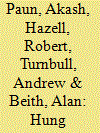

|
|
|
|
|
| Publication |
2010.
|
| Summary/Abstract |
The return of a hung parliament at the 2010 general election is a serious possibility. But due to Westminster's limited recent experience of parliaments under 'no overall control' there is little institutional memory in Whitehall or Westminster, and even less public understanding, of what the implications would be. This article sets out to analyse the principal challenges that would be faced by government, opposition, parliament and the media in the event of a hung parliament. Drawing on experience from Canada, New Zealand and Scotland, we discuss the difficulties that may arise during the immediate government formation process and in the course of making minority or multiparty governance work on an ongoing basis. We conclude that a hung parliament need not undermine political stability or effective governance, but that all actors would need to adapt their behaviour and should therefore prepare carefully for this eventuality.
|
|
|
|
|
|
|
|
|
|
|
|
|
|
|
|
| 5 |
ID:
096257
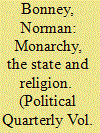

|
|
|
|
|
| Publication |
2010.
|
| Summary/Abstract |
Aspects of contemporary monarchy and government in relation to religion are out of step with contemporary society and require systematic reform. The removal of religious and gender discrimination in the arrangements for succession to the monarchy would be in conformity with modern anti-discrimination attitudes. The monarchy should also consider stepping back from its religious role. The monarch has an official role as Supreme Governor of the Church of England but less than a quarter of the population identify as Anglican and in its current attempts to be inclusive the monarchy seeks to respect and support other religions whose beliefs and practices are at variance with those of the C of E and the general population. In Scotland a new settlement could be promoted by the disestablishment of the Church of Scotland (comparable to the situation in Wales and Northern Ireland) and the ending of separate Roman Catholic state education.
|
|
|
|
|
|
|
|
|
|
|
|
|
|
|
|
| 6 |
ID:
096263
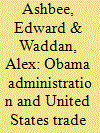

|
|
|
|
|
| Publication |
2010.
|
| Summary/Abstract |
For all the focus on economic issues in the wake of the crisis of 2008 the Obama administration has remained ambiguous about a central component of economic policy. As both candidate and President, Obama has sent mixed messages about trade policy. This ambiguity reflects wider uncertainty within the Democratic Party about global trading relationships and this paper explores and assesses the reasons for this uncertainty. A large part of the answer lies in the disparate sources of support for the Democrats. That is, the party has courted support from interest groups and core groups of voters that have widely divergent views about the value of trade liberalisation.
|
|
|
|
|
|
|
|
|
|
|
|
|
|
|
|
| 7 |
ID:
096264
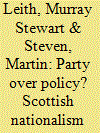

|
|
|
|
|
| Publication |
2010.
|
| Summary/Abstract |
The Scottish National Party (SNP) won control of Scotland's devolved government in the 2007 election yet opinion polls show no majority for its objective of independence in Europe. While the party is adept at exploiting short-term political opportunity structures in the wider British context, as well as appealing to the 'opinion electorate', it appears less successful at persuading a majority of Scottish voters to agree with its core ideology. Helpful parallels can be drawn between 2007 and the last time the party polled over 30 per cent of the popular vote in Scotland at the 1974 (October) British General Election-then, as now, the Scottish voter appears to be willing to distinguish between party and policy.
|
|
|
|
|
|
|
|
|
|
|
|
|
|
|
|
| 8 |
ID:
096254


|
|
|
|
|
| Publication |
2010.
|
| Summary/Abstract |
While British policing has an unparalleled worldwide reputation for excellence, its system of governance has not been formally examined for almost fifty years. Known as the tripartite system, giving overlapping but compatible powers and duties to the Home Secretary, to local Police Authorities and to Chief Officers of Police, it is now long overdue for reconsideration and adjustment. More than one political party is suggesting significant reform but only of individual parts of the system. Given other issues concerning the police, particularly the number of United Kingdom forces and the fixation with the number of police officers as an indication of political success, there is now an urgent need for agreement that policing in Britain should have a holistic and cross-party re-examination, possibly but not necessarily in the form of a Royal Commission.
|
|
|
|
|
|
|
|
|
|
|
|
|
|
|
|
| 9 |
ID:
096256


|
|
|
|
|
| Publication |
2010.
|
| Summary/Abstract |
This article systematically explores the political context behind Labour and the Conservatives' new commitment to a British Bill of Rights. This is linked to conflicting incentives to resist the current trajectory towards rights constitutionalism ('Constitutional Freeze'), to further encourage further rights constitutionalism ('Constitutional Fire') and to engage in largely cosmetic change ('Constitutional Smoke'). Ultimately, the latter has proved dominant for both parties. This demonstrates the difficulty of building political momentum behind significant revision of institutional responsibility for protecting human rights in stable, democratic settings. It specifically illustrates the strong barriers which both a hegemonic policy preserving and an 'aversive' constitutionalising dynamic must overcome to succeed.
|
|
|
|
|
|
|
|
|
|
|
|
|
|
|
|
| 10 |
ID:
096255


|
|
|
|
|
| Publication |
2010.
|
| Summary/Abstract |
Anthony Crosland is the outstanding revisionist in the history of the British Labour party and is often said to have been its most influential thinker since the Second World War. His unusual personality is evaluated in relation not only to his political ideas but also to his personal career.
|
|
|
|
|
|
|
|
|
|
|
|
|
|
|
|
| 11 |
ID:
096260


|
|
|
|
|
| Publication |
2010.
|
| Summary/Abstract |
Using the Parliamentary Communications Allowance, MP David Drew recently conducted a large scale research project into public opinion on the British Constitution. There could not have been a better time to do so. Not only are we in the wake of severe economic and political crises, but also a period of unprecedented legislative interest in the constitution. Coordinated by Ed Leighton (an undergraduate at the LSE), the project consisted of a postal survey of 43,000 households, public debates around the constituency and workshops in local schools. The response from the public was incredible, and the results both interesting and unexpected. This article will outline some of those findings and demonstrate that large scale consultations with the public are both readily achievable and warmly welcomed. That this can all be done within the budget of the Parliamentary Communications Allowance also shows that at its best this fund can be used to genuinely engage with the public.
|
|
|
|
|
|
|
|
|
|
|
|
|
|
|
|
| 12 |
ID:
096265
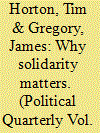

|
|
|
|
|
| Publication |
2010.
|
| Summary/Abstract |
Reporting on our recent book, The Solidarity Society, this article explores the way in which the design of welfare programmes interacts with and shapes the underlying quality of social relations between members of society-and, through this, public attitudes to welfare. Given that sustaining generous welfare over long timescales requires the support of electorates, this 'relational' dimension of welfare policy is crucial for the long-term strategy of tackling poverty and inequality. The article looks in particular at the 'welfare dilemmas' that can arise from tensions between targeting and universalism and between need and entitlement, where the distributional and relational elements of welfare policy work against one another. We conclude that entrenching a generous welfare settlement will require strong elements of both universalism and reciprocity in the design of welfare.
|
|
|
|
|
|
|
|
|
|
|
|
|
|
|
|
|
|
|
|
|